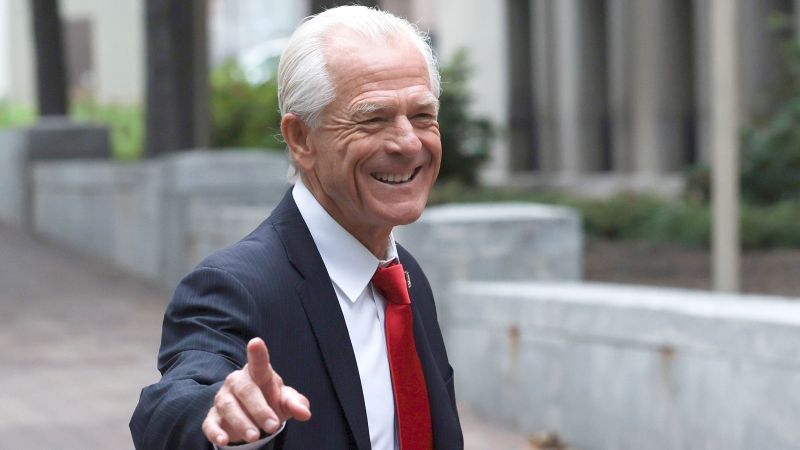Federal Judge Criticizes Peter Navarro’s Defense in Contempt of Congress Case
The federal judge overseeing Peter Navarro’s contempt of Congress criminal case has expressed doubts about the strength of his defense arguments. This uncertainty adds a new twist to Navarro’s upcoming trial, leaving many wondering how he will be able to defend himself.
Navarro, a former trade adviser to Donald Trump, testified in his defense during a recent pre-trial hearing. He is facing charges for defying subpoenas issued by the House select committee investigating the US Capitol attack on January 6, 2021. Navarro claims he did so because Trump asserted executive privilege.
However, during the hearing, US District Judge Amit P. Mehta appeared highly skeptical of Navarro’s testimony. The judge pointed out that Navarro’s account only represents one side of the conversation, leaving crucial details missing.
“I still don’t know what the president said,” Mehta told Navarro’s attorney. The judge also dismissed Navarro’s claim that Trump expressed regret for not allowing him to testify, calling it “pretty weak sauce.”
The absence of testimony from Trump could leave Navarro without direct evidence that he was acting under the former president’s direction. This lack of evidence seemed to frustrate even Navarro’s own legal team during the hearing.
Despite the challenges, Navarro remains confident in his case. He believes it is a crucial test for congressional authority and the separation of powers. He urged people to donate to his legal defense fund, emphasizing that the case has already cost over half a million dollars.
The judge will make a decision later this week on whether Navarro’s testimony can be used in his trial next month. This trial follows the conviction of another former Trump adviser, Steve Bannon, on the same charges.
The hearing also involved a disagreement over how to include written testimony from a key defense witness. Navarro’s team wants a stipulation, while prosecutors suggest an affidavit. The judge will consider leaving the record open for the witness to submit her testimony.
As Navarro’s case proceeds, it will be important to settle the law on these questions and establish precedent for future cases. The outcome of this trial could have significant implications for the balance of power between Congress and the presidency.
Title: Judge Criticizes Peter Navarro’s Testimony in Contempt Case as ‘Weak Sauce’
Introduction:
In a recent contempt case involving former White House trade advisor Peter Navarro, a judge has expressed disappointment and criticized the quality of Navarro’s testimony. The judge’s scathing remarks shed light on the importance of credible and substantive testimonies in legal proceedings, emphasizing the need for individuals to uphold their responsibilities when called upon to provide evidence.
Background:
Peter Navarro, a prominent figure in the Trump administration’s trade policies, found himself entangled in a contempt case related to his alleged failure to comply with a subpoena. As part of the legal process, Navarro was required to provide testimony to support his defense. However, the judge overseeing the case found Navarro’s testimony to be lacking in substance and credibility, leading to a scathing critique of his performance.
The Judge’s Critique:
During the proceedings, the judge openly expressed disappointment with Navarro’s testimony, describing it as ‘weak sauce.’ This colloquial term, often used to describe something lacking in strength or substance, aptly captured the judge’s dissatisfaction with the quality of Navarro’s defense. The judge’s critique highlights the importance of providing robust and reliable evidence when called upon to testify in a legal setting.
Importance of Credible Testimony:
Credible testimony is the cornerstone of any legal proceeding. It serves as a vital tool for judges and juries to assess the veracity of claims and make informed decisions. When individuals fail to provide substantive and reliable testimony, it undermines the integrity of the legal process and hampers the pursuit of justice.
Navarro’s Weak Defense:
Navarro’s testimony was criticized for its lack of clarity, coherence, and evidentiary support. The judge noted that Navarro failed to provide concrete evidence or compelling arguments to support his defense against the contempt charges. This weak defense not only hindered Navarro’s case but also raised questions about his commitment to upholding the principles of justice and accountability.
The Impact on the Legal System:
The judge’s critique of Navarro’s testimony serves as a reminder to all individuals involved in legal proceedings of the importance of fulfilling their responsibilities when called upon to provide evidence. It underscores the need for individuals to approach testimonies with diligence, honesty, and a commitment to the truth. Failure to do so not only weakens one’s own case but also undermines the credibility and effectiveness of the entire legal system.
Conclusion:
The judge’s scathing critique of Peter Navarro’s testimony in the contempt case highlights the significance of credible and substantive testimonies in legal proceedings. Navarro’s weak defense not only hindered his own case but also raised concerns about the integrity of the legal process. This incident serves as a reminder to all individuals involved in legal proceedings to approach their responsibilities with utmost diligence, honesty, and respect for the principles of justice. Only by upholding these values can we ensure the fair and effective functioning of our legal system.








